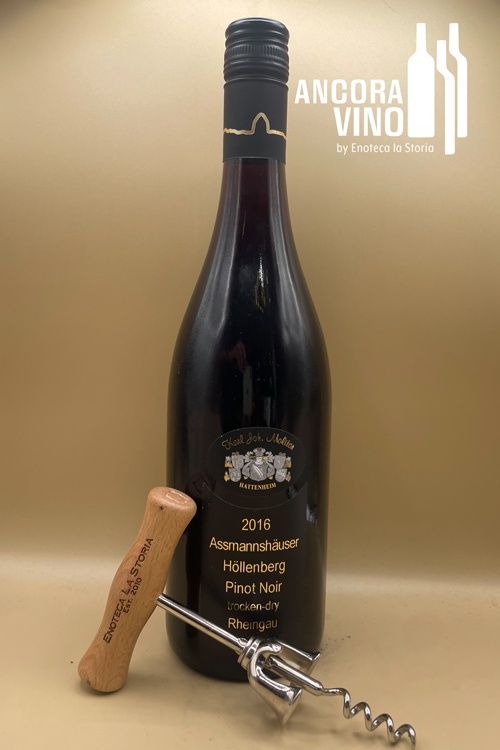2016 Karl Joh. Molitor 'Assmannshäuser Höllenberg' Spätburgunder Trocken
I love German Pinot! I spent the first half of January in Germany, and although I drank mostly beer and apfelwein (hard apple cider) I took the opportunity to taste every German red wine I found. Historically maligned, this style is really coming to the forefront now. Germany has historically been associated with Riesling, and for good reason- much of the country’s climate has been too cold to ripen red grapes properly. The vineyard that this fruit is sourced from, the Assmannshäuser Höllenberg (don’t giggle!) has been known to produce high quality Pinot Noir since the 13th century, due to its incredibly steep slope and quartz-filled soils, which reflect the heat from the Rhine river below and allow the Pinot to ripen fully. In fact, our friend and Master Sommelier Eric Entrikin considers this the best vineyard for Pinot Noir in Germany. These wines can be a bit hard and austere in their youth, which is why it’s wonderful we’ve been able to snag the last few cases of the wonderful 2016 vintage to share with you. It’s just starting to enter its drinking window right now, with a wonderful combination of fresh fruit, rustic earthiness, and tertiary complexity. Cook up some sausage or schnitzel and crack this one open! -Ryan Smith Certified Sommelier
100% Pinot Noir from the single vineyard Assmannshäuser Höllenberg. Hand picked, fermented with native yeasts, and aged in large, old neutral barrels. There’s very little information out there about this wine!
This is a fantastic, rustic Pinot Noir that's finally entering its prime drinking window after 7ish years in the bottle. Light bodied, with rustic red cherry fruit, German Pinot's characteristic spice note, and a woody, herbal note. Tannins are soft and acidity has mellowed a bit with age, but is still quite fresh. Drink with food!
The Assmannshäuser Höllenberg is a renowned Pinot Noir vineyard in a warmer, west-facing section of the Rheingau. It is situated at the point where the Rhine River bows, so the vineyards are south-facing. This, combined with the slate rich soil, means the vineyard captures and retains the sun's heat, creating optimum conditions for growing Pinot Noir vines. It is one of the steepest locations in the Rheingau with a gradient of 45 percent. The microclimate of sun-lit slopes, the balancing and heat-reflecting Rhine at its feet and the ideal composition of the slate and quartzite soils makes it unusual in being prime Pinot Noir territory since at least the 13th century, even though it is surrounded by many of Germany’s best Riesling territory.
Karl Molitor inherited the estate from his father, Johann Baptist Molitor, in 1971. Karl was very fortunate to have married his wife, Rosel, seeing that she came from a vintner's family in Rüdesheim, owning some prime sites in that area, as also part of the famed Höllenberg site in Assmannshausen. They now cultivate more than 7.5 hectares (nearly 19 acres) of vineyards, mainly planted with Riesling. New underground cellars, warehouse and house were built in 1975 behind and outside the village of Hattenheim, at the foot of the famous Steinberg vineyard. Their eldest son, Klaus, completed his viticultural studies and has now inherited the estate. It is very much a family concern with all the work been managed by the family itself, from pruning the vines to bottling; help only being needed during the vintage time.

